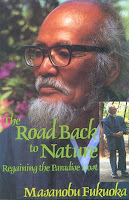Masanobu Fukuoka: Philosopher of Farming

Masanobu Fukuoka, the pioneer of "natural" farming, which eschews plowing, weeding and the use of fertilizers or pesticides, died of old age at his home in Iyo, Ehime Prefecture on Saturday, according to Breitbart. He was 95.
Fukuoka was the author of "The One Straw Revolution," a book that has been translated into English, Korean, Thai and several other languages, and the recipient of the Deshikottam Award, India's most prestigious award, and the Philippines' Ramon Magsaysay award for public service, both in 1988.
After attending an agricultural college in Gifu Prefecture and working at the customs office in Yokohama and an agricultural laboratory in Kochi Prefecture, Fukuoka returned to his native Ehime Prefecture to practice the natural farming method that does not require artificial fertilizers or pesticides and goes beyond organic farming.
He advocated natural farming in various parts of Asia and Africa and also made efforts at greening deserts using such ideas as enclosing seeds in clay pellets.
Masanobu Fukuoka was born in 1914 in a small farming village on the island of Shikoku in Southern Japan. He was educated in microbiology and worked as a soil scientist specializing in plant pathology, but at the age of twenty-five he began to have doubts about modern agriculture science.
Fukuoka wrote:
"If a single new bud is snipped off a fruit tree with a pair of scissors, that may bring about a disorder which cannot be undone…. Human beings with their tampering do something wrong, leave the damage unrepaired, and when the adverse results accumulate, work with all their might to correct them."
"To become one with nature -- agriculture is an occupation in which a farmer adapts himself to nature. To do that, you have to gaze at a rice plant and listen to the words from the plant. If you understand what the rice says, you just adjust your heart to that of the rice plants and raise them. In reality, we do not have to raise them. They will grow. We just serve nature. A piece of advice I need to give you here. When I say gaze at a rice plant or stare at its true form, it does not mean to make an observation or to contemplate the rice plant, which makes it an object different from yourself. It is very difficult to explain in words. In a sense, it is important that you become the rice plant. Just as you, as the subject of gazing, have to disappear. If you do not understand what you should do or what I am talking about, you should be absorbed in taking care of the rice without looking aside. If you could work wholeheartedly without yourself, that is enough. Giving up your ego is the shortest way to unification with nature."
Fukuoka believed that farming is related to the spiritual health of the farmer. "Natural farming is not just for growing crops," he said, "it is for the cultivation and perfection of human beings."

Comments
http://www.soilandhealth.org/01aglibrary/01aglibwelcome.html
As an aside, from looking at his picture, I am almost sure that I have seen Mr. Fukuoka in my local train station more than once. What a pity I didn't know who he was. Obviously, a person well worth knowing!
http://permaculturetokyo.blogspot.com/
And you think you saw him on the train? Makes me think I should stop and talk to the next old guy with a long white beard ;)